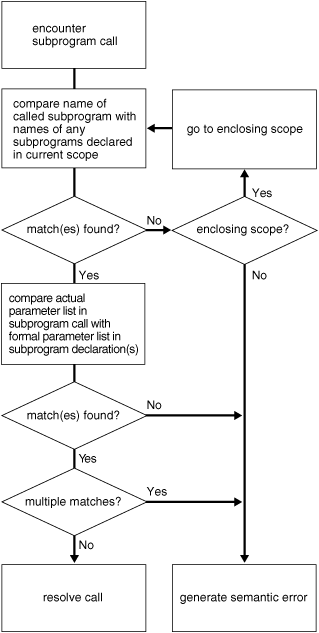Subprogram Invocation Resolution
When the PL/SQL compiler encounters a subprogram invocation, it searches for a matching subprogram declaration—first in the current scope and then, if necessary, in successive enclosing scopes.
A declaration and invocation match if their subprogram names and parameter lists match. The parameter lists match if each required formal parameter in the declaration has a corresponding actual parameter in the invocation.
If the compiler finds no matching declaration for an invocation, then it generates a semantic error.
Figure 9-1 shows how the PL/SQL compiler resolves a subprogram invocation.
Figure 9-1 How PL/SQL Compiler Resolves Invocations

Description of "Figure 9-1 How PL/SQL Compiler Resolves Invocations"
In Example 9-25, the function balance tries to invoke the enclosing procedure swap, using appropriate actual parameters. However, balance contains two nested procedures named swap, and neither has parameters of the same type as the enclosing procedure swap. Therefore, the invocation causes compilation error PLS-00306.
Example 9-25 Resolving PL/SQL Procedure Names
DECLARE
PROCEDURE swap (
n1 NUMBER,
n2 NUMBER
)
IS
num1 NUMBER;
num2 NUMBER;
FUNCTION balance
(bal NUMBER)
RETURN NUMBER
IS
x NUMBER := 10;
PROCEDURE swap (
d1 DATE,
d2 DATE
) IS
BEGIN
NULL;
END;
PROCEDURE swap (
b1 BOOLEAN,
b2 BOOLEAN
) IS
BEGIN
NULL;
END;
BEGIN -- balance
swap(num1, num2);
RETURN x;
END balance;
BEGIN -- enclosing procedure swap
NULL;
END swap;
BEGIN -- anonymous block
NULL;
END; -- anonymous block
/
Result:
swap(num1, num2);
*
ERROR at line 33:
ORA-06550: line 33, column 7:
PLS-00306: wrong number or types of arguments in call to 'SWAP'
ORA-06550: line 33, column 7:
PL/SQL: Statement ignored